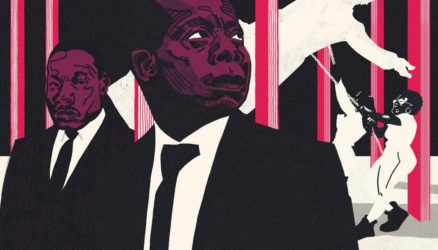 Featured – The History That James Baldwin Wanted America to See. By Eddie S. Glaude, Jr. / The New Yorker
Featured – The History That James Baldwin Wanted America to See. By Eddie S. Glaude, Jr. / The New Yorker
What Baldwin saw on that dangerous road that led to King’s death, in Memphis, was the difficult question of whether or not the country had the courage to confront its demons. Could America tell itself the truth about how it had arrived at this moment? And did it have the moral stamina to surrender the comfort of its lies? These people, Baldwin argued, had to see themselves otherwise. New laws, gestures of sympathy, and acts of racial charity would never suffice to change the course of the country. Something more radical had to be done; a different history had to be told. “All that can save you now is your confrontation with your own history . . . which is not your past, but your present,” Baldwin said. “Your history has led you to this moment, and you can only begin to change yourself by looking at what you are doing in the name of your history.” Must read
 The Difference Between First-Degree Racism and Third-Degree Racism. By John Rice / The Atlantic
The Difference Between First-Degree Racism and Third-Degree Racism. By John Rice / The Atlantic
The unrelenting protests, the supportive statements from white leaders nationwide, and the early momentum behind policing policy changes are all indications that this might be a turning point in our nation’s battle against racism. Will we seize this opportunity or will we lose momentum, showing once again that America can be “a 10-day nation” that moves on too easily to the next crisis, as Martin Luther King Jr. warned a fellow civil-rights activist in 1963? Read more
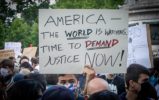 The US Needs to Be Treated Like the Racist Pariah State It Is. By Elie Mystal / The Nation
The US Needs to Be Treated Like the Racist Pariah State It Is. By Elie Mystal / The Nation
Lots of factors brought white South Africa to heel—most important, the tireless work of black South Africans, who demanded their humanity despite terror, torture, and imprisonment. But the moral suasion of the international community, the shaming and the economic boycotts, also helped. Read more
 Why Is the G.O.P. Fighting to Preserve Monuments to Traitors in the Capitol? By The Editorial Board / NYT
Why Is the G.O.P. Fighting to Preserve Monuments to Traitors in the Capitol? By The Editorial Board / NYT
The Senate majority leader, Mitch McConnell of Kentucky, was more outspoken in his opposition. On Tuesday, he derided brewing efforts to “airbrush the Capitol and scrub out everybody from years ago who had any connection to slavery” as “nonsense” and “a bridge too far.” He even felt moved to list for reporters some of the early presidents who owned slaves. “Washington did. Jefferson did. Madison did. Monroe did.” Is this really the hill that the Party of Lincoln wants to fight on in 2020? What an ignoble, lost cause. Read more
Related: Black Realities and White Statues: The Fall of Confederate Monuments. By Michael Dickinson / AAIHS
 Juneteenth and the Meaning of Freedom. Emancipation is a marker of progress for white Americans, not black ones. By Jelani Cobb / The New Yorker
Juneteenth and the Meaning of Freedom. Emancipation is a marker of progress for white Americans, not black ones. By Jelani Cobb / The New Yorker
There’s a paradox inherent in the fact that emancipation is celebrated primarily among African-Americans, and that the celebration is rooted in a perception of slavery as something that happened to black people, rather than something that the country committed. The paradox rests on the presumption that the arrival of freedom should be greeted with gratitude, instead of with self-reflection about what allowed it to be deprived in the first place. Emancipation is a marker of progress for white Americans, not black ones. Trump, in planning to go to Tulsa for Juneteenth, was not trolling black people. He was trolling the United States Constitution. Read more
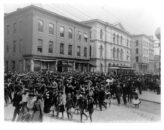 The Hidden History Of Juneteenth. By Gregory P. Downs / TPM
The Hidden History Of Juneteenth. By Gregory P. Downs / TPM
One hundred fifty years ago today, the U.S. Army took possession of Galveston Island, a barrier island just off the Texas coast that guards the entrance to Galveston Bay, and began a late-arriving, long-lasting war against slavery in Texas. This little-known battle would endure for months after the end of what we normally think of as the Civil War. This struggle, pitting Texas freedpeople and loyalists and the U.S. Army against stubborn defenders of slavery, would become the basis for the increasingly popular celebrations of Juneteenth, a predominantly African-American holiday celebrating emancipation on or about June 19th every year. Read more
Related: Tulsa and the Many Sins of Racism. By Paul Krugman / NYT
 Donald Trump’s Empty Campaign Rally in Tulsa. By Eric Loch / The New Yorker
Donald Trump’s Empty Campaign Rally in Tulsa. By Eric Loch / The New Yorker
In some ways, what Donald Trump didn’t say on Saturday night in Tulsa, Oklahoma, at a rally that was billed as his big post-pandemic return to the campaign trail, matters more than what he did. In more than ninety minutes onstage, not one mention of the murder of George Floyd. Not one mention of the murder of Breonna Taylor. Barely a mention of the hundred and nineteen thousand Americans killed by covid-19, or of the tens of millions thrown out of work, facing uncertain futures for themselves and their families. Read more
Related: Trump Is Losing His Grip on White America. By William Saletan / Slate
Related: Trump allies see a mounting threat: Biden’s rising evangelical support. By Gabby Orr / Politico
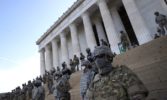 What Defund the Police really means: swapping social control for investment. By Robert Reich / The Guardian
What Defund the Police really means: swapping social control for investment. By Robert Reich / The Guardian
Some societies center on social control, others on social investment. Social-control societies put substantial resources into police, prisons, surveillance, immigration enforcement and the military. Their purpose is to utilize fear, punishment and violence, to maintain what they consider order. Social-investment societies put more resources into healthcare, education, affordable housing, jobless benefits and children. Their purpose is to free people from the risks and anxieties of daily life and give everyone a fair shot at making it. Read more
Related: It is not easy to convict cops. So start with structural reforms. By Paul Butler / Wash Post
 Why did Black Lives Matter protests attract unprecedented white support? By Jesse Washington / The Undefeated
Why did Black Lives Matter protests attract unprecedented white support? By Jesse Washington / The Undefeated
Where did all these white people come from? The killing of George Floyd has inspired an outpouring of white empathy in a way that the shootings of Trayvon Martin, Walter Scott or Tamir Rice – just to name a few – did not. Although white people have been part of the black freedom struggle since the days of the Underground Railroad, their current participation is unlike anything we have ever seen. Read more
 The South is red. It’s also Black. By Zachary B. Wolf / CNN
The South is red. It’s also Black. By Zachary B. Wolf / CNN
It’s so very simple to distill the coming election as between President Donald Trump, who is stoking the racial divides in this country, and Joe Biden, who is trying to appeal to voters of color. But the whole truth is way more interesting. More than half of Black people in America live in the portion of the country that is also home to the most reliably pro-Trump voters. Read more
 Harris Rises To Top of Biden’s VP List After Klobuchar’s Strategic Exit. By Adrian Carrasquillo / Newsweek
Harris Rises To Top of Biden’s VP List After Klobuchar’s Strategic Exit. By Adrian Carrasquillo / Newsweek
Senator Amy Klobuchar, whose case to be Joe Biden’s running mate had been badly bruised in recent weeks due to her record on race, declared on MSNBC that the Democratic nominee should choose a woman of color to begin to “heal this nation.” The appearance served as a big moment in its own right, but it cut two ways: As both Klobuchar’s exit from the VP race and an effort to remove Senator Elizabeth Warren from the picture. And with that, Senator Kamala Harris of California rose to the top of the VP list. Read more
 Top State Department official resigns in protest of Trump’s response to racial tensions in the country. By Seung Min Kim / Wash Post
Top State Department official resigns in protest of Trump’s response to racial tensions in the country. By Seung Min Kim / Wash Post
A senior State Department official who has served in the Trump administration since its first day is resigning over President Trump’s recent handling of racial tensions across the country — saying that the president’s actions “cut sharply against my core values and convictions.”Mary Elizabeth Taylor, assistant secretary of state for legislative affairs, submitted her resignation Thursday. Read more
 Why Are Black Women and Girls Still an Afterthought in Our Outrage Over Police Violence? By Brittney Cooper / Time
Why Are Black Women and Girls Still an Afterthought in Our Outrage Over Police Violence? By Brittney Cooper / Time
In a country reeling from being involuntary witnesses to the murder of George Floyd by Minneapolis police, Breonna Taylor’s death does not fit the spectacular forms of police killing that we have come to associate with America’s nefarious lynching past. Read more
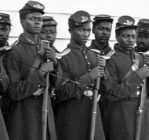 Black Americans, crucial workers in crises, emerge worse off – not better. By Calvin Schermerhorn / The Conversation
Black Americans, crucial workers in crises, emerge worse off – not better. By Calvin Schermerhorn / The Conversation
Black Americans had served in the war, too, making up more than 10% of the Union Army, a quarter of the Union Navy and untold numbers aiding the Union effort. In many national crises since then, black Americans have also been essential workers. But serving in crucial roles has not resulted in economic equality. Government responses to economic crises have historically set black Americans back relative to whites, stripping black wealth and setting new and stronger barriers in paths to success – even in times of national economic growth. Read more
Related: The Gaps Between White and Black America, in Charts. By Patrick Sharkey, Keeanga Yamahtta Taylor and
Related: Minority-owned business are struggling more than others. Here’s why. By Katie Lobosco / CNN
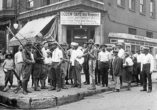 Racial violence and a pandemic: How the Red Summer of 1919 relates to 2020. By Erik Ortiz / NBC News
Racial violence and a pandemic: How the Red Summer of 1919 relates to 2020. By Erik Ortiz / NBC News
Racial strife flaring across the United States. Black Americans standing up to societal structures in unpredictable ways. People enduring months of a deadly pandemic infecting millions worldwide, shuttering businesses and heightening fears of a lengthy economic downturn. That was 1919, during what would later be coined the “Red Summer,” when communities across America were reeling from white mobs inciting brutality against Black people and cities were still wrestling with a third wave of the so-called Spanish flu pandemic that emerged the previous year. The story line parallels with today. Read more
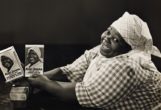 Aunt Jemima and Uncle Ben deserve retirement. They’re racist myths of happy Black servitude. By Michael Twitty / NBC News
Aunt Jemima and Uncle Ben deserve retirement. They’re racist myths of happy Black servitude. By Michael Twitty / NBC News
The character of Aunt Jemima is an invitation to white people to indulge in a fantasy of enslaved people — and by extension, all of Black America — as submissive, self-effacing, loyal, pacified and pacifying. It positions Black people as boxed in, prepackaged and ready to satisfy; it’s the problem of all consumption, only laced with racial overtones. Read more
 As colleges grapple with racist legacies, a monument at Ole Miss will finally go. By Susan Svrluga / Wash Post
As colleges grapple with racist legacies, a monument at Ole Miss will finally go. By Susan Svrluga / Wash Post
For more than a century, a Confederate monument has towered over the heart of the University of Mississippi, a stark reminder of divisions that have endured long past the Civil War. On Thursday, state officials finally relented: The monument can go. Read more
Related: NCAA bans championship events in Mississippi because of its flag. By Matt Bonesteel / Wash Post
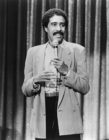 How Richard Pryor Changed the Way Comedy Sees Police Brutality. By Jason Zinoman / NYT
How Richard Pryor Changed the Way Comedy Sees Police Brutality. By Jason Zinoman / NYT
In contrast with the amiable treatment white people receive from a friendly cop who lives in their neighborhood, Pryor demonstrated how black people must make a show of being nonthreatening when stopped. Enunciating every word slowly at a volume and tension that performs compliance, he did an impression of what was required: “I. Am Reaching. Into. My. Pocket. For. My License.” Read more
 How Hawks coach Lloyd Pierce has become a leading voice in Atlanta and the NBA. By Marc J. Spears / The Undefeated
How Hawks coach Lloyd Pierce has become a leading voice in Atlanta and the NBA. By Marc J. Spears / The Undefeated
Thousands of people were focused on Atlanta Hawks coach Lloyd Pierce. Several of his players and coaching staff stood behind him. Rapper Jeezy looked on as well. But this wasn’t an NBA game at State Farm Arena. Pierce was at the NAACP’s peaceful “March on Georgia” event in Atlanta on Monday, speaking about racial injustice, police brutality and voting rights. Read more
Visit our home page for more articles, book/podcast and video favorites. And at the top of this page register your email to receive notification of new editions of Race Inquiry Digest. Click here for earlier Digests.
Use the buttons below to share the Digest in an email, or post to your Facebook, Linkedin or Twitter accounts.